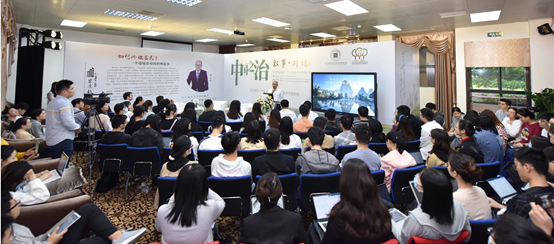Collaborative Education|| The Third Session of “Chinese Governance: Narration-Dialogue” Activity Successfully Held
The third session of the “Chinese Governance: Narration-Dialogue” activity was successfully held in D113 of the university’s teaching building on October 30, 2021, where Hao Yusong, the secretary of the CPC Jingxi Municipal Committee in Guangxi province was invited to be a keynote speaker along with Mr. Zhang Shuwei and Mr. Lian Hong from the School of Government in Sun Yat-sen University as dialogue speakers. Based upon the experience shared by Secretary Hao Yusong, speakers of both sides engaged in a heated discussion with a theme on “How to effectively govern border counties and cities.” The activity welcomed the attendance of Deputy Secretary Tan Yingyao of the school in addition to the passionate participation of students.

At the commencement of the activity, Mr. Lian Hong introduced Secretary Hao Yusong and the present-day realities of Jingxi City, laying the foundation for Secretary Hao to tell “the stories of the governance of border counties and cities.” Mr. Lian emphasized that the “Chinese Governance: Narration-Dialogue” was an iconic activity that observed the 20th anniversary of the founding of the school with a purpose of enlightening students with practical experience and conducting high-quality interaction between both theories and practices of governance. While listening to the stories, students were expected to compare various practices and to develop profound thoughts concerning the theories.
Subsequently, the keynote speaker delivered a speech. Secretary Hao, an excellent alumnus, shared his views concerning the difficulties and breakthroughs of the governance of border counties and cities with both enthusiasm and rational consideration. Due to its unique characteristics, the governance of Jingxi City is more complicated, posing a large number of issues and factors that need to be considered and balanced as opposed to other general county-level cities. To realize the goal at hand, Jingxi has made active and sufficient use of national policies and taken local realities into full consideration so as to promote the integration of national unity and local effectiveness. The local advantages lie in rich mineral resources, a favorable geographic location, and abundant resources in regard to tourism. In the 13th Five-Year Plan period, while striving to eradicate poverty, Jingxi has consolidated its industrial foundation and a cornerstone of border trade, thus realizing the transformation from “no trade in borders” to “developing trade through borders.” In the following 14th Five-Year Plan, Jingxi will write a new chapter, namely through strengthening the industrial foundation, promoting border trade exchanges, developing regional tourism, and promoting urban construction.

During the dialogue session, dialogue speaker Zhang Shuwei raised a series of targeted questions including how to support small and micro businesses, how to manage migrant workers from Vietnam, how to realize poverty alleviation through increasing people’s confidence and assisting them to acquire knowledge and skills, what are the relative characteristics of tourism in Jingxi, and how to balance the relationship between new town construction and the protection of ethnic characteristics. Combining his enriched and pragmatic experience of governance, Secretary Hao gave detailed answers to each question. For example, to solve the problems mentioned above, Jingxi vigorously supports mineral processing and trading enterprises, sets a clear boundary between legal and illegal migrant workers, achieves poverty alleviation through industrial development, skilled talents training, and people’s confidence is boosted by excellent examples.
When talking about career choices, Secretary Hao held that the most crucial element was to listen to the deep voice in your heart, to identify your interest, and pursue a profession that you would like to dedicate yourself to. This suggestion inspired the students in attendance who were encouraged to explore and to find their interests without fear of trial and error. Furthermore, Secretary Hao advised that despite the importance of theories, actual practices of governance should be combined when students are choosing their topics of their theses. If this concept is neglected, their theses will lack practical meaning. He hoped that students can investigate the reality of operational mechanisms of the Chinese government through fieldwork, taking a down-top approach to reveal the secret of Chinese governance, and finally achieving theoretical dialogue and innovation.
In the Q&A session, students asked questions and requested comments concerning a multitude of issues including, “the biggest challenge of administering Jingxi,” “how can college talents adapt to the government environment,” “citizens’ attitude toward tourism development,” and “interesting stories with ethnic minorities” with great passion. Secretary Hao respectively gave answers on the combination of the actual development of Jingxi. He said that the biggest obstacles are the underdeveloped transportation situation and influences left by wars of the past which have resulted in slower speed of development. He believes, however, with favorable government policies, advantageous local characteristics, and enormous public support, Jingxi has an immense space for development and a promising future. Furthermore, he said that the advantages of college talents to work in government institutions are their strong learning capacities and flexible thinking patterns. Under the mechanism of learning by doing, they can rapidly adapt to the government environment. Secretary Hao responded to every question with thorough explanations, showing us the image of a pragmatic, realistic, forthright, and sincere community-level leader.



